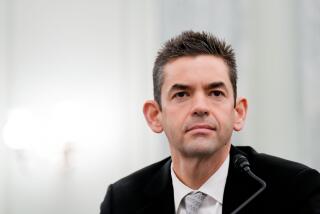Head of NASA Resigns Post Under Pressure
- Share via
Richard H. Truly, the former astronaut who brought the National Aeronautics and Space Administration back from catastrophe after the explosion of the space shuttle Challenger, has resigned under pressure as head of the agency after a series of bitter disputes with White House officials over the future of the space program.
The retired Navy vice admiral has locked horns repeatedly with the National Space Council, chaired by Vice President Dan Quayle, over NASA’s priorities, according to various sources. On Monday night Truly met for half an hour with President Bush, and shortly thereafter submitted a brief letter resigning from the post he has held for three years.
The White House released the letter Wednesday, but it offers no explanation of why Truly is resigning just as the agency is preparing to do battle with Congress over its budget. The resignation will take effect on April 1, so the agency will be without either a director or a deputy director during critical appropriations hearings in Washington.
Several sources said Truly no longer had the President’s confidence and was forced out in the culmination of a long dispute with White House officials.
Asked why Truly was leaving, a close associate said only: “He serves at the pleasure of the President.” In an interview with the Associated Press, Truly said, “It’s a situation where the President decided . . . to make a change.”
“He was very good for the agency, but there was a widespread feeling he had to step aside,” said John M. Logsdon, director of George Washington University’s Space Policy Institute in Washington.
Truly has been particularly troubled over who should set space policy. By law, that responsibility lies with the White House’s National Space Council, but prior to the Bush Administration the council deferred to NASA, thus allowing the agency to set its own policy.
In recent years, the council has sought to steer the agency toward such ambitious goals as sending humans to Mars and establishing a permanent base on the moon. Truly was known to have serious doubts about both of those goals, and instead sought to emphasize the space shuttle program and the troubled Space Station Freedom, which has climbed in cost from $8 billion to at least $40 billion.
“He was fighting for a vision that was out of step with what the country was willing to pay for,” said Logsdon, referring to the shuttle and the space station. Truly frequently clashed with White House officials who also back the space station but wanted to emphasize Bush’s bolder--and even more expensive--plan to send humans to Mars.
Truly, 54, was especially fond of the shuttle. He served as pilot aboard the second flight in 1981, when the vehicle was still relatively untested, and he commanded the shuttle on the first night launch in 1983.
He has been equally enthusiastic about the space station, despite its soaring cost and a lack of support even from the scientific community that is supposed to use it.
“Dick Truly has done a wonderful job, but it’s all been pretty well linked to the shuttle,” said one key source who asked not to be identified. “When the Challenger went down, he was the key resource that went through the shuttle program from top to bottom and made it work again.
“But the feeling is that this was his weakness as well as his great strength because he had difficulty breaking away and getting on with broader programs.”
Other sources said Truly lacked the charisma and the leadership needed to win congressional support for NASA’s programs and recharge an agency that has seemed adrift in recent years. He has had to carry that burden alone because of the abrupt resignation last fall of his deputy, J. R. Thomson, a gregarious leader who complemented Truly’s low-key profile.
The departure of the top two leaders could lead to major revamping of the agency, something that has been recommended repeatedly by numerous commissions.
“A lot of us have felt for some time that NASA needs to rethink its programs,” said Louis Friedman, executive director of the Pasadena-based Planetary Society. He said that might be easier now with new leadership.
Even some of Truly’s top lieutenants shared that thinking, according to various sources, but nearly all praised him for his character and contributions to the space program.
“The nation owes him a tremendous debt of gratitude” for returning NASA to space after the Challenger disaster, said Thomas O. Paine of West Los Angeles, who directed NASA during the Apollo mission to the moon.
Truly left NASA and returned to the Navy in 1983, but when the Challenger exploded in 1986 he rejoined the space agency and took over the shuttle program. When the late James Fletcher resigned as NASA administrator in 1989, President Reagan asked Truly to take over the top post.
When he leaves NASA, he will have served the federal government for 37 years.
More to Read
Get the L.A. Times Politics newsletter
Deeply reported insights into legislation, politics and policy from Sacramento, Washington and beyond. In your inbox twice per week.
You may occasionally receive promotional content from the Los Angeles Times.










